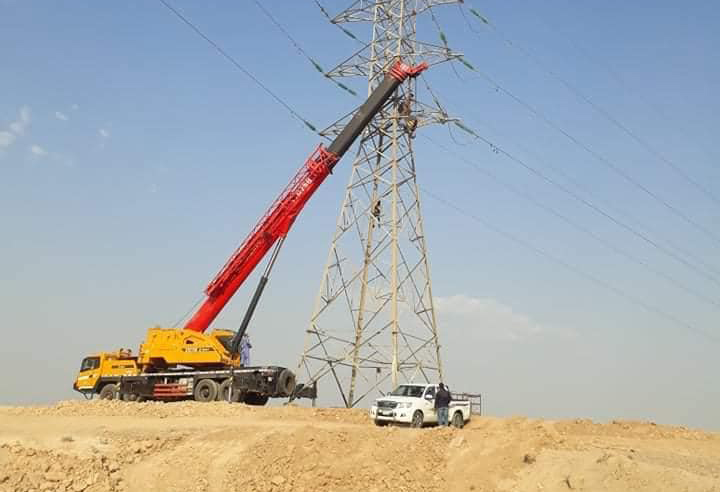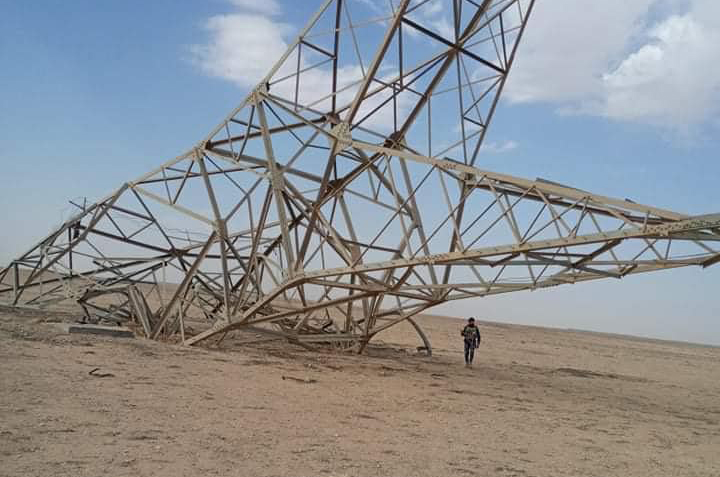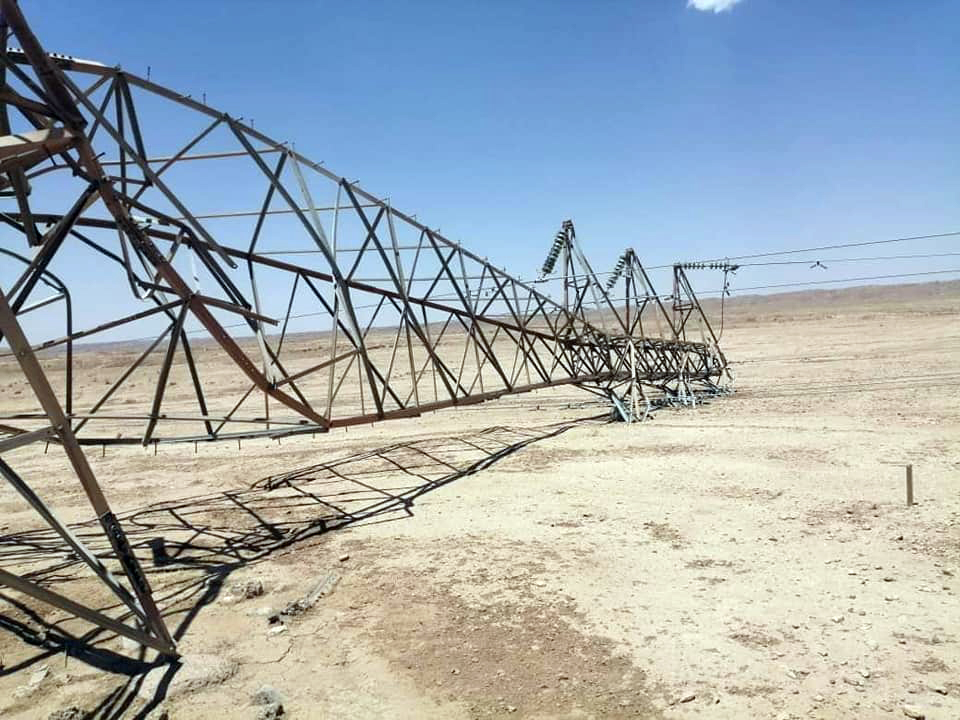Total power shutdown in some areas of Kirkuk, Diyala and Salahaddin provinces with hours of outage in other parts of those three provinces due to frequent pre-planned attacks by the extremist militants of so-called Islamic State in Iraq and Syria ISIS against power transmission towers in the baking summer.
The Iraqi ministry of electricity said in a statement on August 5th that 13 towers for transmission of power were damaged by the militants in 48 hours in Ninawa, Kirkuk and Salahaddin, including Kirkuk-Gayarra (in Mosul) by IED, causing damage to five towers.
Besides, many towers linking the four provinces such as Tikrit-Samarra and Shahid Abdullah- Tikrit-Dor were targeted which led to shortage of power supply as the turbines are power operated.
“Targeting power towers in the last week left local miss power and water in the blazing summer,” said Hussein Abdul-Qadir, director general of electricity in Salahaddin province.
The temperature ranges between 45-50 Celsius degrees most of Iraqi provinces in summer throughout June up to end of August.
Abdul-Qadir confirmed that locals receive only 4 hours of national power a day and the gap to be filled by diesel private generators whom charge ten folds of national subdised service.
“Fixing the damaged tower is to be carried out by Salahaddin and Kirkuk directorates of power which has not been resumed yet. The heat put people in a tight corner.”
According to follow-up by KirkukNow, the main towers of power transmission in Diyala, Salahaddin, Kirkuk and Ninawa have been targeted over ten times in a week.
“Daesh is in charge of detonation of power towers to create feud between the public and the government," a senior security official in Diyala told KirkukNow on the condition of anonymity as he is unauthorized to speak to the media.
Daesh is in charge of detonation of power towers to create feud between the public and the government
Guards were deployed to safeguards the 250 power towers in the province and last week a suspect was arrested while trying to detonate a power tower, the senior official added.
Iraqi Prime Minister and commander-in-chief Mustafa al-Kadhimi last Wednesday chaired a meeting of the ministerial council for national security where he ordered intensified efforts to protect power towers.
“Daesh is incapable of fatal attacks against people so their target now hs been shifted to power towers harming ordinary people,” Diyala security official added.
In the last seven months, 20 towers for power transmission have been targeted in the province of Salahaddin and Diyala causing power shutdown and outage in the towns of Sa’diya, Qaratapa, Jalawla, Tikrit, Samarra, Dujail, Balad and several others.
Four policemen were killed in both provinces by the deadliest attacks.

Diyala, August 2021- A tower for power transmission in Khanaqin fixed by the technicians. Ministry of electricity
Iraq's electricity ministry has cited a number of causes for the prolonged and widespread cuts including terrorist attacks on electricity lines, shortages of fuel for power stations, and the suspension of energy supplies from neighboring Iran.
The Iraqi ministry of electricity follows the standard structure of power generation, transmission then distribution, where every stage of the delivery process is also segmented into regions, each region has a separate company. Iraq is divided into four regions: the south, the middle and upper Euphrates or midlands, Baghdad, and the north.
In 2019, Iraq's gas and thermal power plants generated only 70% of the demand for electricity, local and international studies have shown. Besides, Iraq imports 1200 MW through four lines from its neighbor Iran, 300-400 from Turkey and 200 Mw from Jordan.
“Khurmatu and all other districts of Salahaddin face power shortage and rely on private generators,” said Hussein Ali, Duz Khurmatu Police chief.
The series of attacks targeting power towers affected power supply to Kirkuk as well.
“The national power is three hours on and three hours of while in neighborhoods of Qadisiya, Nasir and Askari they have less than 10 hours a day due to load on Baghdad,” said Ghassan Razwani, media officer of directorate of electricity in Kirkuk.
IS militants are regrouping in the rural areas of the disputed territories between Baghdad and Erbil. They are targeting Iraqi forces and civilians in the suburbs of Diyla, Kirkuk Ninawa and Erbil, leaving tens of casualties and causing material damage to power plants, oil wells, houses, cattle, orchards and vehicles of the villagers.
The disputed territories extend from Khanaqin in the east on the border with Iran to the oil rich city of Kirkuk heading to the west of Mosul in Shingal, home to Ezidi ethno-religious minority, on the border with Syria.
Average power consumption of Kirkuk is 1000 Mega Watts MW while it receiving less than that leading to frequent power outage.
Late hours of August 3rd, hundreds of residents of Altun Kopri town, northeast of Kirkuk, protested inadequate national power supply to the town in the blazing summer.
Altun Kopri (The golden Bridge) is part of the oil rich-city of Kirkuk, home to about 1.2 million Kurds, Turkmen and Arabs, according to Kurdistan Regional Government KRG figures in 2018.
Located 238 kilometers north of Baghdad, Kirkuk is an ethnically mixed province for 1,2 million Kurds, Sunni and Shiite Arabs, and Turkmen. It has long been at the center of disputes between Baghdad and the Erbil.
Though the five oil wells of Kirkuk pump out three million barrels of crude oil a month marketed for over 200 million American Dollars, the province misses proper utilities of power supply, drinking water, garbage collection, and basic health care and education system badly hurt by corruption and long years of war and instability.
A policeman was killed on August 5th while trying to detonate a bomb under a power tower in Riyadh subdistrict of Hawija district, west of Kirkuk.

August 2021- An Iraqi soldier under a tower for power transmission damaged by IS militants. Ministry of electricity
A well-informed source in Diayala electricity anonymously said fixing targeted towers is a big burden on the government.
“The targeed area is to be surveyed that it’s clean of Daesh and IEDs in collaboration with security forces as the towers are based in valleys accessible to the terrorists,” Diayal electricity official said.
At the early hours of July 31st, militants attacked Unit Five of Iraqi army deployed adjacent to Halwan bridge, in the middle of Khanaqin-Jalawla highway. Four Iraqi soldiers were killed and the main tower of power transmission in the region was damaged.
“Daesh militants want to prove their existence and harm people.”
“Daesh militants want to prove their existence and harm people.”
Commander of Iraqi operations’ command Brigadier General Tahsin al-Khafaji said the ministries of defense and interior in cooperation with the intelligence have set a mutual plan to protect the towers of power by using up-to-date technology.
“Local tribes are also assigned in some areas to monitor their regions,” Khafaji told the semi-official Iraqi News Agency INA. “Drones to monitor inaccessible rural areas beside thermal CCTVs.”
Karwan Salihi contributed to this report.





